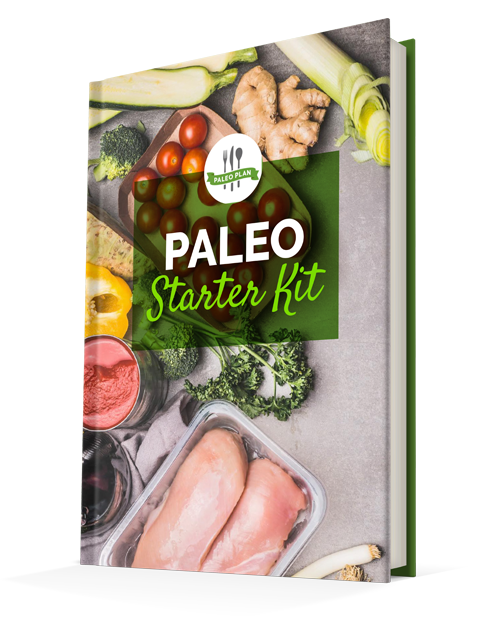
As a clinical nutritionist at PaleoPlan, I have the pleasure of helping thousands of people across the globe to also reverse their autoimmune conditions by modifying diet and lifestyle. Here are the most common questions I’m asked about autoimmune disease.
Chances are that you know someone with an autoimmune condition, or perhaps you’re one of the estimated 20 percent of the population affected by autoimmunity. (1) By the young age of 30, I had been diagnosed with rheumatoid arthritis, lupus, alopecia areata, autoimmune hypothyroidism, and eczema…all autoimmune diseases. I was told I’d need lifelong medications to control my symptoms, but I wasn’t willing to accept drugs as a solution, so I started doing some research.
I went back to school and obtained my Master of Science in Human Nutrition, writing my master’s thesis on the connection between diet and autoimmune disease, citing research that’s based in antiquity, yet unknown by most doctors today. What I learned is that all autoimmune disorders are intimately connected to gut health. Moreover, the gut/disease connection has been known for over 2,000 years! As the father of modern medicine (Hippocrates) said all those years ago: “All disease begins in the gut.”
Using what I learned, I changed my diet (abandoning nearly 25 years of vegetarianism) and went Paleo. The results were undeniable, and nearly a decade later I’ve been able to keep my autoimmune conditions in remission by using the wisdom of Hippocrates: “Let food be thy medicine, and medicine be thy food.”
Top 10 Questions About Autoimmune Disease
As a clinical nutritionist at PaleoPlan, I have the pleasure of helping thousands of people across the globe to also reverse their autoimmune conditions by modifying diet and lifestyle. Here are the most common questions I’m asked about autoimmune disease.
1. What is autoimmunity?

Stated simply, autoimmunity happens when the immune system gets confused and turns against us. Normally, the immune system keeps us healthy by attacking anything foreign that gains access into the body. When you catch a cold, your immune system produces antibodies and inflammation to destroy the infection. In autoimmunity, this immune response won’t turn off, which results in the production of chronic (long-term) inflammation and the destruction of healthy tissues. If left unchecked, it can cause serious damage, and even death.
2. How common is autoimmunity?
Autoimmune diseases are extremely common these days. When considered collectively, they are the most common diseases in the United States – and possibly worldwide. (2, 3) Some clinicians speculate that nearly everyone has some degree of autoimmune activity occurring in their body. Women are affected much more than men (likely due to hormones) and make up more than 75 percent of all autoimmune cases. (4)
3. How many different autoimmune diseases are there?
To date, nearly 100 different autoimmune diseases have been identified and theoretically, an endless number could exist because the immune system can attack virtually any part of the body. All autoimmune diseases involve an overactive immune system attacking healthy tissue, and what distinguishes them is the part of the body currently under attack.
For example, rheumatoid arthritis happens when the immune system attacks the joints. Hashimoto’s and other autoimmune thyroid conditions are the result of damage to the thyroid gland. Lupus is when your body’s organs are the victim. Psoriasis and eczema occur when your immune system attacks your skin. Multiple sclerosis is when the myelin sheath surrounding nerves is the target, and type 1 diabetes results from an autoimmune attack of the pancreas. While these conditions are very different in their outward manifestations, they share a common root cause: an immune system that won’t turn off. The resulting chronic inflammation is a key characteristic of all autoimmune disorders.
4. Can you have more than one autoimmune disease?
It’s very common to have more than one autoimmune disease, and they tend to occur in clusters and also run in families. (5) When the immune system is revved up and producing inflammation and antibodies, virtually any and all healthy tissues can fall under attack. In many cases, the first sign of autoimmunity is a malfunctioning thyroid. (6)
5. What causes autoimmune disease? Is there a cure?

The medical community is in conflict about what causes autoimmunity to develop. A number of different theories exist, and while researchers don’t agree on the exact details, they all share the belief that something from the environment is triggering these conditions. (7) This external trigger could be a virus, bacteria, another pathogen, a toxin, or something we ingest that gains access to our body by leaking through the gut wall.
Many people are told autoimmunity is genetic and other than medications, there isn’t much that can be done about it. A more integrative approach to medicine would argue that while autoimmunity is indeed influenced by our genes, it’s possible to turn these genes “off” so they are not actively expressing disease.
A new theory set forth by Dr. Alessio Fasano suggests a trio of triggers must be simultaneously present in order for autoimmune disease to be active, and if any one of these triggers is removed, it will go into remission. (8) This trio of triggers includes:
- a genetic predisposition to autoimmune disease
- a leaky gut
- one or more triggers causing the leaky gut
While we can’t remove genetic predisposition, we can turn these genes off by addressing the other two factors of the trio, which boil down to healing leaky gut. While there is technically no “cure” for autoimmune disease, many people have achieved remission simply by restoring their gut health.
6. How does a leaky gut trigger autoimmunity?
The gut lining is only ONE single cell layer thick, designed to allow the passage of nutrients while preventing the entrance of toxins. Nature put 80 percent of our immune system beneath the gut wall to protect us from any “bad guys” that manage to sneak through the gut and into the body.
During leaky gut syndrome, tiny holes develop in the gut lining and stuff enters your body that shouldn’t be there (like bad bacteria, undigested food particles, toxins, etc.) In response, the immune system produces inflammation to combat these foreign invaders. If the leaky gut never heals, inflammation can become chronic (long term) and cause widespread tissue destruction. This chronic inflammation also flips on the gene switch for autoimmunity, causing the disease to express itself in a vicious cycle. To achieve remission, we must turn off the genes and the inflammatory response by healing the leaky gut.
7. What causes leaky gut (and subsequently, autoimmunity)?
Two main triggers have been shown to produce leaky gut in everyone (not just people with autoimmunity): (9)
- Gluten and similar proteins found in grains and beans (and nuts and seeds to a lesser extent)
- Dysbiosis (imbalanced gut microflora)
Our collective gut health has been on a steady decline since the mid-1900s due to the increased consumption of refined and processed foods, grains, polyunsaturated vegetable oils, and carbohydrates, coupled with a decrease in saturated fats, fermented foods, food variety, and nutrient density. (10) By returning to an ancestral diet (how people ate only a few generations ago), the gut can heal, which disengages the immune system and stops the autoimmune attack.
8. Can Paleo reverse autoimmunity?

The Paleo diet naturally excludes the main triggers of leaky gut (grains, beans, common food allergens like dairy, refined and processed foods, excess carbohydrates, etc.), while including a higher percentage of healing fats and fibers. Paleo is beneficial for many autoimmune patients who often start experiencing relief from their symptoms within days or weeks. Depending on the severity, it can take longer, and some people need to take things a step further to fully heal their gut and reverse autoimmunity.
9. What is the AIP (Autoimmune Protocol)?
The Autoimmune Protocol (AIP) is a stricter form of Paleo that removes other potential gut irritants like nightshades, egg whites, nuts, seeds, and more. The AIP also encourages the consumption of bone broth, collagen, fermented foods, and other gut restorative measures.
People often wonder if they have to follow the AIP forever to keep autoimmunity in remission. Because the AIP restricts so many foods, it’s not ideal (and often unnecessary) to remain on it long term. When someone is new to Paleo, I recommend starting with strict Paleo for at least six weeks to allow for more variety and a gradual detox period. Paleo alone can do wonders to reverse autoimmunity and several other chronic conditions. If you’re still having symptoms after six weeks, then consider following the AIP for up to a year. Some people benefit more by following a GAPS/SCD approach to healing the gut, whereas others end up needing herbal antibiotics or probiotic support to treat underlying infections, or nutrient supplementation to correct underlying deficiencies.
10. Does anything other than diet trigger autoimmunity?
Other factors, such as stress, alcohol, medications including NSAIDs, infections, and other stressors can also influence gut permeability and instigate autoimmunity (although diet seems to play the biggest role for most people). We call Paleo a “lifestyle” rather than a “diet” because of its holistic approach addressing all of the essential lifestyle factors necessary for achieving optimal health.
The Bottom Line
If you suffer from an autoimmune disease, please know that there is hope! Many people achieve and maintain remission from their autoimmune (and other) chronic conditions simply by following an ancestral way of living and eating, and tending to the health of their gut.
In good health,
Kinsey Jackson, MS, CNS®, CFMP®
Certified Nutrition Specialist® Clinician
Certified Functional Medicine Practitioner®
